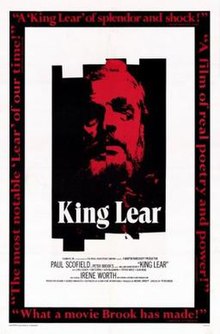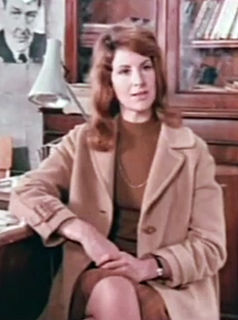
Salesman is a 1969 direct cinema documentary film about door-to-door Bible salesmen, directed by brothers Albert and David Maysles, and Charlotte Zwerin.
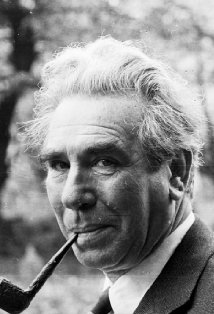
Sir Donald Wolfit, CBE was an English actor-manager, known for his touring wartime productions of Shakespeare. He was especially renowned for his portrayal of King Lear.

Romeo and Juliet is a 1936 American film adapted from the play by William Shakespeare, directed by George Cukor from a screenplay by Talbot Jennings. The film stars Leslie Howard as Romeo and Norma Shearer as Juliet, and the supporting cast features John Barrymore, Basil Rathbone, and Andy Devine.
David Edelstein is the chief film critic for New York magazine and CBS Sunday Morning. He lives in Brooklyn, New York, with his wife and two daughters.
The Florida Film Critics Circle (FFCC) is a film critic organization founded in 1996. The FFCC comprises 30 film critics from Florida-based print and online publications. At the end of each year, the FFCC members vote on the Florida Film Critics Circle Awards for outstanding achievements in films released that year. The organization also awards the Pauline Kael Breakout Award, named after film critic Pauline Kael, and the Golden Orange Award for Outstanding Contribution to Film. The FFCC membership includes film critics from Miami Herald, Miami New Times, Sun-Sentinel, Folio Weekly, Bloody Disgusting, WJNO Radio, WTVT, The Daytona Beach News-Journal, and Tampa Bay Times.

A Man for All Seasons is a 1966 British biographical drama film in Technicolor based on Robert Bolt's play of the same name and adapted for the big screen by Bolt himself. It was released on 12 December 1966. It was directed by Fred Zinnemann, who had previously directed the films High Noon and From Here to Eternity.

Going Steady: Film Writings 1968–1969 is the third collection of film reviews by the critic Pauline Kael, comprising the years 1968-1969, when she first began her film-reviewing duties at The New Yorker and which covers, " a crucial period of social and aesthetic change at the end of the sixties."

The Shooting Party is a 1985 British drama film directed by Alan Bridges and based on the book of the same name by Isabel Colegate. The film is set in 1913 and shows the way of life of English aristocrats, gathered for pheasant shooting and general self-indulgence. Their way of life is contrasted with the local rural poor, who serve as 'beaters', driving the game for the aristocrats to shoot. It was entered into the 14th Moscow International Film Festival.

Romeo and Juliet is a 1954 film adaptation of William Shakespeare's play of the same name. It was directed by Renato Castellani and stars Laurence Harvey as Romeo, Susan Shentall as Juliet, Flora Robson as the Nurse, Mervyn Johns as Friar Laurence, Bill Travers as Benvolio, Sebastian Cabot as Lord Capulet, Ubaldo Zollo as Mercutio, Enzo Fiermonte as Tybalt and John Gielgud as the Chorus.

William Shakespeare's Romeo and Juliet may be one of the most-screened plays of all time. The most notable theatrical releases were George Cukor's multi-Oscar-nominated 1936 production Romeo and Juliet, Franco Zeffirelli's 1968 film Romeo and Juliet, and Baz Luhrmann's 1996 MTV-inspired Romeo + Juliet. The latter two were both, at the time, the highest-grossing Shakespeare films. Cukor featured the mature actors Norma Shearer and Leslie Howard as the teenage lovers while Zeffirelli populated his film with beautiful young people, and Baz Luhrmann produced a heavily cut fast-paced version aimed at teenage audiences.
Over fifty films of William Shakespeare's Hamlet have been made since 1900. Seven post-war Hamlet films have had a theatrical release: Laurence Olivier's Hamlet of 1948; Grigori Kozintsev's 1964 Russian adaptation; a film of the John Gielgud-directed 1964 Broadway production, Richard Burton's Hamlet, which played limited engagements that same year; Tony Richardson's 1969 version featuring Nicol Williamson as Hamlet and Anthony Hopkins as Claudius; Franco Zeffirelli's 1990 version starring Mel Gibson; Kenneth Branagh's full-text 1996 version; and Michael Almereyda's 2000 modernisation, starring Ethan Hawke.

Love and Money, also known as Love & Money, is a 1982 American drama film directed by James Toback and starring Ray Sharkey.
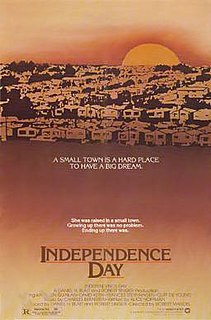
Independence Day is a 1983 film directed by Robert Mandel from a script by the novelist Alice Hoffman. It was designed by Stewart Campbell and shot by Charles Rosher. It stars Kathleen Quinlan, David Keith, Cliff DeYoung, Frances Sternhagen and Dianne Wiest.
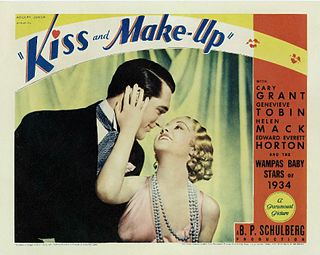
Kiss and Make-Up is a 1934 romantic comedy film starring Cary Grant as a doctor who specializes in making women beautiful. Helen Mack and Genevieve Tobin play his romantic entanglements. The film was based on the play Kozmetika by István Békeffy. All of the WAMPAS Baby Stars of 1934 were cast in roles in the film.
Tell Me Lies is a 1968 British drama film directed and produced by Peter Brook. Based on a play by Denis Cannan called US, it stars Mark Jones, Pauline Munro, Eric Allan, and Robert Langdon Lloyd. The film was shot in London in the summer of 1967 and starred actors under contract to the Royal Shakespeare Company. The film is based on the American involvement in the Vietnam War and was highly controversial at the time of its release.
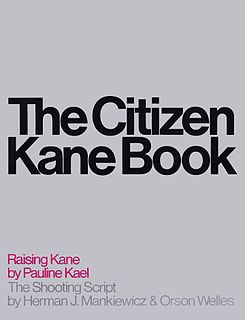
"Raising Kane" is a 1971 book-length essay by American film critic Pauline Kael, in which she revived controversy over the authorship of the screenplay for the 1941 film Citizen Kane. Kael celebrated screenwriter Herman J. Mankiewicz, first-credited co-author of the screenplay, and denigrated the contributions of Orson Welles, who co-wrote, produced and directed the film, and performed the lead role. The 50,000-word essay was written for The Citizen Kane Book (1971), as an extended introduction to the shooting script by Mankiewicz and Welles. It first appeared in February 1971 in two consecutive issues of The New Yorker magazine. In the ensuing controversy Welles was defended by colleagues, critics, biographers and scholars, but his reputation was damaged by its charges. The essay was later discredited after Welles's contributions to the screenplay were documented and Kael's own scholarship was called into question.
